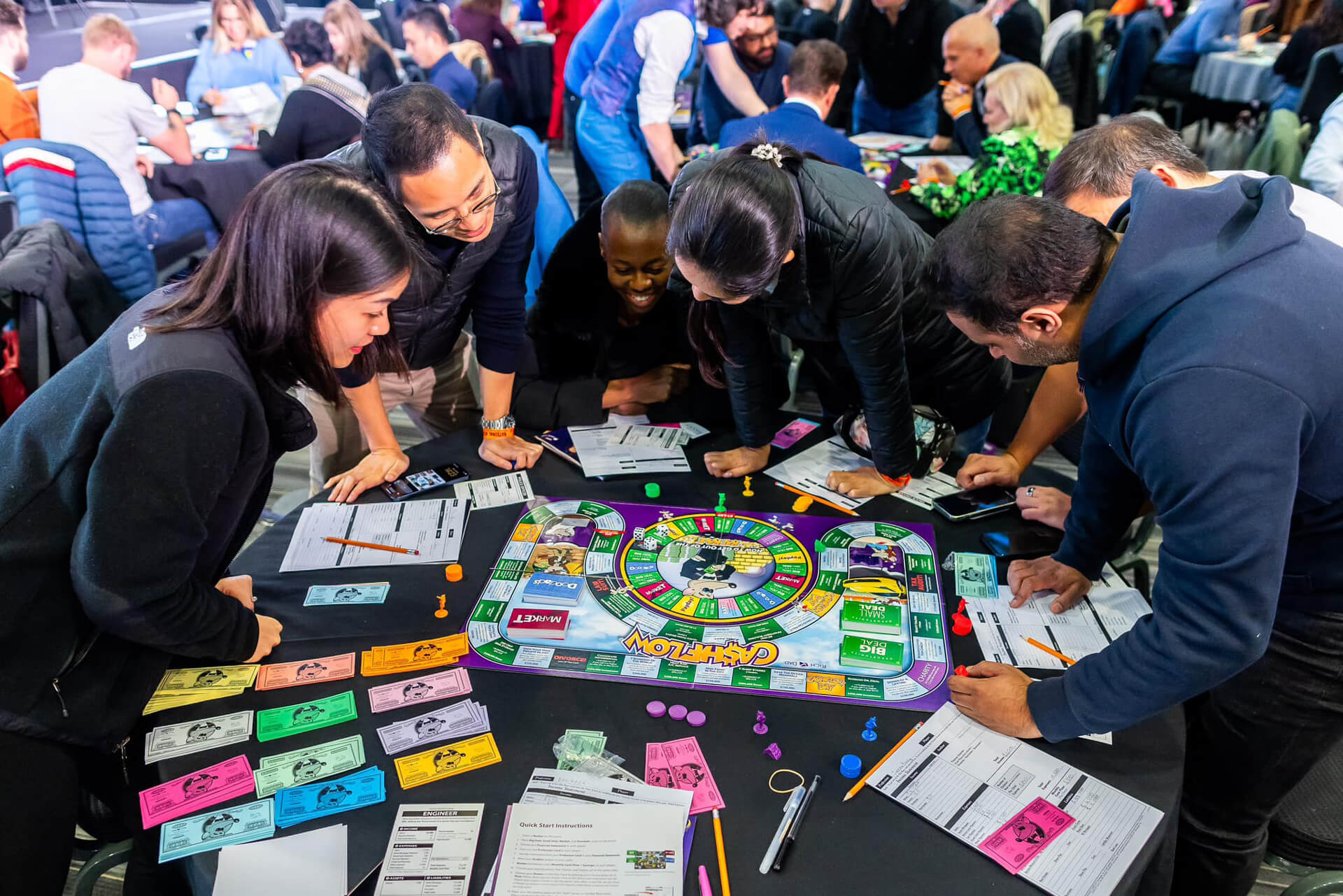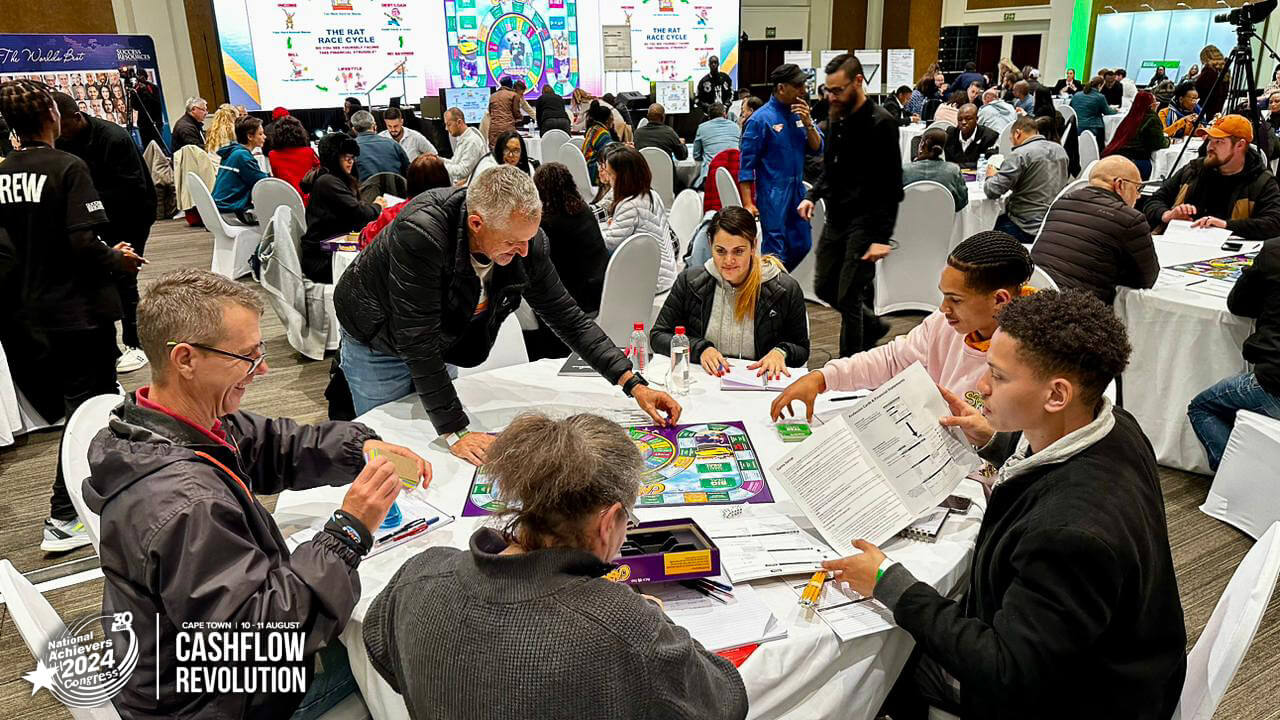The Cashflow Board Game: The #1 Tool to Think Like the Rich
Monopoly teaches you how to bankrupt your friends.


The Cashflow Board Game teaches you how to escape the system that bankrupts everyone.
Most financial education comes from trial, error, and sometimes painful mistakes. But what if a board game could rewire how you think about money—letting you simulate investments, risks, and cash flow, all without real-world stakes? That’s the magic of Robert Kiyosaki’s Cashflow Board Game: a “mindset simulator” that teaches the principles of wealth-building in an interactive, often eye-opening way.
What Is the Cashflow Board Game, and Why Is It So Effective?
Created by Robert Kiyosaki, author of Rich Dad Poor Dad, Cashflow is designed to demystify concepts like assets vs. liabilities, passive income, and leveraging debt. Through gameplay, you experience the consequences of financial decisions—good and bad—in a safe environment. You learn how to:
Identify and acquire income-producing assets
Escape the “rat race” of trading time for money
Manage risk and multiply wealth via smart investments
“Cashflow is more than a game. It’s a mindset simulator.” — Robert Kiyosaki
By playing repeatedly, you internalize patterns and behaviors of wealthy individuals, developing financial IQ faster than through reading alone.

Why Most People Stay Stuck (and Broke)
Traditional education rarely covers real-world money management. A 2023 CNBC survey found that only 23% of U.S. adults have taken a personal finance course, and many can’t distinguish an asset from a liability. Consequently, people work hard yet struggle to build lasting wealth.
The Cashflow game flips that script by simulating real financial scenarios—without risking your real savings. You see firsthand why:
Earning more isn’t enough unless you invest wisely
Debt, when used strategically, can build assets instead of crushing you
Cash flow (what’s left after expenses) matters more than raw income
What the Experts Say
Financial educators and entrepreneur communities have all praised and utilise Cashflow as a means to impart financial knowledge:
Ann Wilson (Author of The Wealth Chef): “Cashflow is one of the best tools to understand the behaviors, beliefs, and patterns around money that keep people stuck. It brings clarity through play.”
Both Entrepreneurs’ Organisation and Young President’s Organisation uses Cashflow to boost participants’ financial IQ and strategic thinking.

Real-World Results: When the Game Becomes Your Life
David’s Story: A 33-year-old engineer from Melbourne played Cashflow at a local meetup. During the game, he realized his real-life liabilities (car loans, credit cards, overextended mortgage) outstripped his assets. Motivated by that insight, he began tracking spending, learned about ETFs, and within 18 months built a passive-income stream that covers his monthly expenses.
“Seeing my finances laid out in the game was painful—but at least I saw what needed fixing. Now I’m on track for real freedom.”
Thousands share similar transformation stories: a board game revealing blind spots and sparking actionable change.

Key Rules & How to Play
Below is a distilled overview of the most important rules and phases, based on the official Cashflow Rules & Instructions. This summary helps you understand gameplay flow and objectives so you can jump in with confidence.
1. Game Structure: Two Phases
Part I – The Rat Race
Represents the typical “working life” where income equals or barely exceeds expenses.
Objective: Increase passive income (from assets) until it exceeds total expenses, enabling you to “get out of the Rat Race.”
Part II – The Fast Track
Represents the world of the wealthy: playing with larger investments and higher stakes.
Objective: After exiting the Rat Race, either purchase your “Dream” goal or accumulate a set amount of Fast Track cash flow (e.g., $50,000). First to achieve this wins.
2. Setup
Select a Banker: Manages cash transactions.
Deal Game Cards: Each player receives an Income Statement/Balance Sheet “Game Card.”
Deal Profession Cards: Assigns starting salary, expenses, and initial savings. Players record these on their Game Card.
Meet Your Auditor: The player on your right verifies your calculations whenever your finances change.
Distribute Cash: Banker pays each player their starting monthly cash flow plus any savings.
Choose Playing Pieces and Dream: Select your “Dream” on the Fast Track (a financial goal). Place your Rat piece at “Start Here” on the Rat Race.
3. Rat Race Gameplay
- Turn Sequence: Roll one die, move clockwise.
- Spaces & Actions:
- Pay Check: Landing on or passing Pay Check grants your monthly cash flow. If negative, you must pay the bank.
- Opportunity (Small/Big Deals): Draw investment cards. Evaluate costs, potential returns, negotiate when allowed.
- Market: Draw Market cards that may let you sell existing assets at specified prices or trigger events affecting all players.
- Doodads: Mandatory expenses (unexpected bills). You may borrow (bank loans) if needed.
- Charity: Optional; donate a percentage of income to gain benefits (e.g., roll extra dice in later turns).
- Baby/Children: Increases expenses.
- Downsized: Lose job for some turns; pay expenses and skip turns
- Financial Options:
- Bank Loans: Borrow in $1,000 increments at 10% monthly interest. Adds to liabilities and increases expenses.
- Paying Off Debt: Voluntarily pay debts to reduce expenses and improve cash flow.
- Bankruptcy: If cash flow becomes negative without enough cash on hand, you may sell assets at half down payment, adjust debts, lose turns, or potentially be out of the game if insolvency persists.
- Exiting Rat Race: When passive income > total expenses, at the start of your turn you move to the Fast Track.
4. Fast Track Gameplay
- Flip Game Card: Calculate your “Buyout” (100× current passive income) as starting Fast Track cash flow. Set your new Fast Track income goal (e.g., current + $50,000).
- Movement: Roll two dice always (unless modified).
- Spaces & Actions:
- Cashflow Day: Landing on/passing grants your Fast Track income automatically.
- Business Investments: Green spaces offering larger deals; purchase to increase Fast Track cash flow. Place token; update Game Card.
- Dreams (Pink spaces): Purchase when you land and have funds. If another player lands on your Dream, cost doubles or more—introducing strategic interaction.
- Charity, Tax Audit, Divorce, Lawsuit: Special events impacting cash.
- Winning Conditions: First to buy their Dream or first to accumulate the target Fast Track cash flow wins.
5. Key Takeaways for Players
- Simulation of Real Decisions: Each card/event emulates financial choices: buying assets, managing liabilities, handling emergencies.
- Importance of Cash Flow: Emphasizes the difference between high income vs. positive cash flow from assets.
- Risk & Opportunity Evaluation: Teaches you to assess deals (Small vs. Big), negotiate, and know when to pass.
- Teamwork & Auditing: Playing with “Auditors” (peers) reinforces accuracy and shared learning.
- Mindset Shift: Experiencing setbacks in-game (bankruptcy, downsizing) builds resilience; successes encourage proactive investing.
For full rules and detailed card explanations, download the official Cashflow Rules PDF

Actionable Takeaways: How to Start Thinking Like the Rich
Even if you don’t own the game (yet), here’s how to apply its principles now:
Track Your Real-Life Rat Race: List income, expenses, assets, liabilities. Identify where passive income lags expenses.
Pay Yourself First: Automate transfers into investments before covering bills.
Invest in Financial Education: Beyond the game—read, attend workshops, join communities that emphasize real-world money management.
Understand Cash Flow Over Income: Evaluate opportunities by their net monthly returns, not just headline ROI.
Leverage Strategic Risk: The wealthy don’t avoid risk; they calculate, manage, and learn from it—just like in Cashflow.
Final Thoughts: Want to Learn How the Rich Actually Think?
You can spend years learning the “hard way,” or you can let a proven tool accelerate your financial IQ. The Cashflow Board Game isn’t a magic bullet, but it is a powerful wake-up call and mindset shifter. By simulating real financial scenarios, it reveals blind spots, encourages strategic thinking, and makes complex concepts tangible through play.
 Ready to Experience Cashflow LIVE?
Ready to Experience Cashflow LIVE?
Join us at Cashflow Revolution—a transformative event inspired by Robert Kiyosaki’s principles and the Cashflow game itself. You’ll get hands-on workshops, real-time simulations, and mentorship from seasoned investors and wealth builders.


